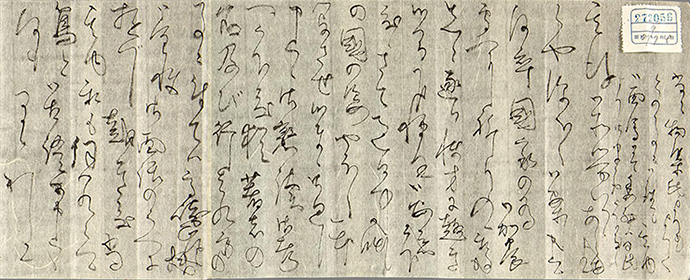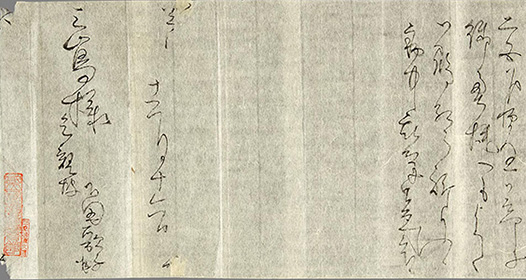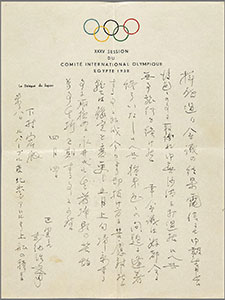Chapter 6 Educators
TSUDA Umeko, 1864-1929
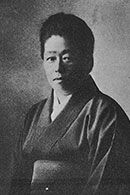 Tsuda was an educator for women in the Meiji and Taisho eras. She went to the United States at the age of eight with four more girls including Yamakawa (married name Oyama) Sutematsu as the first female students to study abroad. After she returned to Japan, she worked as a professor at Kazoku Jogakko (Peeresses' School), Higher Normal School for Women and other schools. In 1900, she established Joshi Eigaku Juku (English School for Women) which later became Tsuda College. She was also the first chairman of Japan YWCA.
Tsuda was an educator for women in the Meiji and Taisho eras. She went to the United States at the age of eight with four more girls including Yamakawa (married name Oyama) Sutematsu as the first female students to study abroad. After she returned to Japan, she worked as a professor at Kazoku Jogakko (Peeresses' School), Higher Normal School for Women and other schools. In 1900, she established Joshi Eigaku Juku (English School for Women) which later became Tsuda College. She was also the first chairman of Japan YWCA.
73 Tsuda Umeko shokan, December 8, 1896[Makino Nobuaki Papers (Letters) : 588]
This is a letter of appreciation written by Tsuda who was a professor at Kazoku Jogakko (Peeresses' School) to Makino Nobuaki who was the Vice Minister of Education. It is not clear what she had requested him earlier, but she is expressing her appreciation to Makino for his great effort. Makino, the second son of Okubo Toshimichi, worked as a prefectural governor and diplomat, and he then assumed important posts including Minister of Education and Minister of Foreign Affairs. Later, he became Lord Keeper of the Privy Seal and played a role of Senior Vassal for Emperor Showa.
SHIMODA Utako 1854-1936
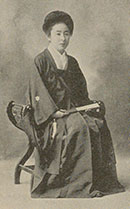 Shimoda was an educator for women and a poet in the Meiji and Showa eras. She worked at the Imperial Household Ministry. The name Utako was given by the Empress for her ability as poet. After resigning from the ministry, she was engaged in establishing Toyo Jojuku for educating upper class women as well as Kazoku Jogakko (Peeresses' School) and Jissen Jogakko (later Jissen Women’s University).
Shimoda was an educator for women and a poet in the Meiji and Showa eras. She worked at the Imperial Household Ministry. The name Utako was given by the Empress for her ability as poet. After resigning from the ministry, she was engaged in establishing Toyo Jojuku for educating upper class women as well as Kazoku Jogakko (Peeresses' School) and Jissen Jogakko (later Jissen Women’s University).
74 Shimoda Utako shokan, December 16, 1886[Mishima Michitsune Papers: 318-6]
This is a letter written by Shimoda who was a professor at Kazoku Jogakko (Peeresses' School) to Mishima Michitsune, the superintendent-general of the Metropolitan Police Department. In the letter, Shimoda is informing Mishima that she will submit the copy of Kuni no sugata (Related material 74) which is the moral textbook she compiled herself to him prior to publishing in order to get his support. She is also asking how the name for the author should be. Shimoda was planning to popularize Kuni no sugata through Ito Hirobumi and other top government officials with whom she had connection. Kuni no sugata was published under the name of Mishima in March of the following year with a preface written by the Minister of Finance, Matsukata Masayoshi. Prior to this, Shimoda published textbooks such as Wabun kyokasho and Shogaku tokuhon.
74 Related material: Kuni no sugata, 1886[Mishima Michitsune Papers: 551-1 (イ)]
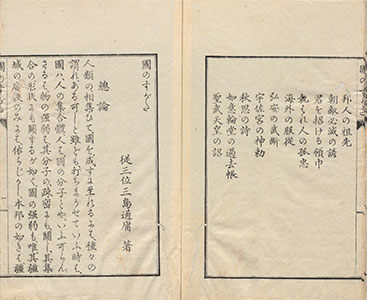
KANO Jigoro, 1860-1938
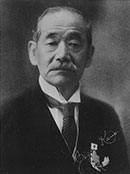 Kano was an educator in the Meiji and Showa eras, and a judo expert. After graduating from the University of Tokyo, he established the Kodokan judo hall. He developed jujutsu and founded judo, and devoted himself in researching and spreading judo. He was the first Japanese member of the IOC (International Olympic Committee), and greatly contributed to developing Japanese sports.
Kano was an educator in the Meiji and Showa eras, and a judo expert. After graduating from the University of Tokyo, he established the Kodokan judo hall. He developed jujutsu and founded judo, and devoted himself in researching and spreading judo. He was the first Japanese member of the IOC (International Olympic Committee), and greatly contributed to developing Japanese sports.
75 Kano Jigoro shokan, April 4, 1938[Shimomura Hiroshi Papers (No.1): 256-1]
In July 1936, the IOC General Assembly decided that the Olympics would be held in Tokyo in 1940, but the protracted Sino-Japanese War jeopardized holding the Olympics. At the IOC General Assembly in Cairo in March 1938, it was decided that the Tokyo Olympics would be held as planned. After attending the general assembly, Kano who had been working hard to host the Olympic Games wrote this letter to Shimomura Hiroshi who was the chairman of the Japan Sports Association and said he still had many difficult issues to be solved. One month after the letter was written, Kano died of pneumonia on a ship returning to Japan. In July of the same year, the It was decided not to hold Olympic Games in Tokyo.





